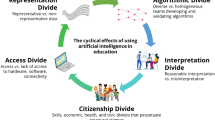Abstract
Set against the backdrop of a STEM-based (science, technology, engineering and mathematics) activity in a teacher education science methods class, the author examines the need for ethics education to be partnered with STEM education. To make the case, the origin of the STEM initiative, undertaken and strongly supported by both US government and corporate sources, is briefly recounted. The STSE initiative (science, technology, society and environment) is posited as a counterpoint to STEM. Also considered are: (a) an historical perspective of science and technology as these impact difficult individual and social decision making; (b) STEM knowledge generation considered through the lens of Habermas’ threefold knowledge typology; and (c) the experiences of the teacher candidates working through the STEM activity when an ethical challenge is posed. The author demonstrates the need for a moral component for science education and makes the case for a partnership between STEM and ethics education. Further, such a partnership has been shown to increase student enjoyment and motivation for their science studies. Three possible ethical frameworks are examined for their theoretical and practical utility in a science classroom.
Similar content being viewed by others
References
Brundtland Commission (formally known as the World Commission on Environment and Development). (1987). Our common future: Report of the world commission on environment and development. London: Oxford University Press.
Bunting, C., & Ryan, B. (2010). In the classroom: Exploring ethical issues with young pupils. In A. Jones, A. McKim, & M. Reiss (Eds.), Ethics in the science and technology classroom: A new approach to teaching and learning (pp. 37–54). Rotterdam: Sense Publishers.
Burke, L. M., & Baker McNeill, J. (2011). “Educate to innovate”: How the Obama plan for STEM education falls short. Backgrounder, 2504, 1–8.
Bybee, R. W. (2013). The case for STEM education: Challenges and opportunities. Arlington, VA: NSTA Press.
Crain, W. C. (1985). Theories of development: Concepts and applications. London: Prentice-Hall.
Crotty, R. (2010). Values education as an ethical dilemma about sociability. In T. Lovat, R. Toomey, & N. Clement (Eds.), International research handbook on values education and student well-being (pp. 631–644). New York, NY: Springer Science and Business Media.
DeLuca, R. (2010). Using narrative for ethical thinking. In A. Jones, A. McKim, & M. Reiss (Eds.), Ethics in the science and technology classroom: A new approach to teaching and learning (pp. 87–102). Rotterdam: Sense Publishers.
Driver, R., Newton, P., & Osborne, J. (2000). Establishing the norms of scientific argumentation in classrooms. Science Education, 84, 287–312.
Dyson, F. (1979). Disturbing the universe. New York, NY: Harper & Row.
Greunewald, D. A. (2004). A Foucauldian analysis of environmental education: Toward the socioecological challenge of the earth charter. Curriculum Inquiry, 34, 71–104.
Habermas, J. (1971). Knowledge and human interests: A general perspective. In J.J. Shapiro (Trans.), Knowledge and human interests (pp. 301–17). Boston, MA: Beacon Press (Original work published 1968).
Herreid, C. F., Schiller, N. A., & Herreid, K. F. (2012). Science stories: Using case studies to teach critical thinking. NSTA Press.
Johnson, R. R. (2010). Balancing acts: A case for confronting the tyranny of STEM. Programmatic Perspectives, 2, 86–92.
Kibert, C. J., Monroe, M. C., Peterson, A. L., Plate, R. R., & Thiele, L. P. (2012). Working toward sustainability: Ethical decision making in a technological world. Hoboken, NJ: Wiley.
Kohlberg, L. (1975). The cognitive-developmental approach to moral education. Phi Delta Kappan, 56, 670–677.
Kolstø, S. D. (2001). ‘To trust or not to trust, …’—Pupils’ ways of judging information encountered in a socio-scientific issue. International Studies in Science Education, 23, 877–901.
Levinson, R. (2006). Teachers’ perceptions of the role of evidence in teaching controversial socio-scientific issues. The Curriculum Journal, 17, 247–262.
Machi, E. (2009). Improving U.S. competitiveness: With k-12 STEM education and training. Washington, DC: The Heritage Foundation.
McKim, A. (2010). Bioethics education. In A. Jones, A. McKim, & M. Reiss (Eds.), Ethics in the science and technology classroom: A new approach to teaching and learning (pp. 19–36). Rotterdam: Sense Publishers.
OECD. (2010). PISA 2009 results: Executive summary. Retrieved from www.oecd.org/edu/pisa/2009
OECD. (2013). PISA 2012 results in focus. Retrieved from http://www.oecd.org/pisa/keyfindings/pisa-2012-results-overview.pdf
Ontario Ministry of Education. (2007). Science and technology, grades 1–8, revised. Toronto: Queen’s Printer for Ontario.
Ontario Ministry of Education. (2008). Science: Grade 9 and 10, revised. Toronto: Queen’s Printer for Ontario.
PCAST—President’s Council of Advisors on Science and Technology (PCAST). (2010). Report to the President. Prepare and inspire: k-12 education in science, technology, engineering, and math (STEM) for America’s future. Retrieved from http://www.whitehouse.gov/sites/default/files/microsites/ostp/pcast-stemed-report.pdf
Reiss, M. (2010). Ethical thinking. In A. Jones, A. McKim, & M. Reiss (Eds.), Ethics in the science and technology classroom: A new approach to teaching and learning (pp. 7–18). Rotterdam: Sense Publishers.
Steele, A., Brew, C. R., & Beatty, B. R. (2012). The tower builders: A consideration of STEM, STSE and ethics in Science Education. Australian Journal of Teacher Education, 37(10), 118–133.
Author information
Authors and Affiliations
Corresponding author
About this article
Cite this article
Steele, A. Troubling STEM: Making a Case for an Ethics/STEM Partnership. J Sci Teacher Educ 27, 357–371 (2016). https://doi.org/10.1007/s10972-016-9463-6
Published:
Issue Date:
DOI: https://doi.org/10.1007/s10972-016-9463-6




